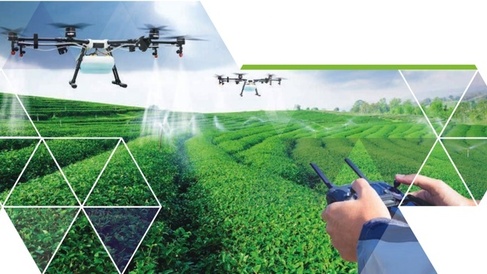To potential industry partners

A Few Earthly Good Reasons to Support an AgriFoRwArdS CDT PhD Student: why we would like you to think about it
There has been always a deep-seated belief that the economic and social prosperity of the UK depends on healthy, profitable businesses. As global market competition has intensified sharply in recent years, to sustain such unparalleled pressure companies have to broaden their scope for innovation and focus on retaining and developing talent among their workforce.
Universities are the resource that can play a crucial role in helping companies to obtain solid advantages over their business competitors as well as to supply highly skilled personnel. Universities are able to do that as they have vast research capabilities and provide their students with diverse skill training, including transferrable skills and skills for enterprising and entrepreneurial activities.
The AgriFoRwArdS consortium, made up of the Universities of Cambridge, Lincoln and East Anglia, have a long history of industry relationships that manifests itself in a variety of ways; starting with expert advice and academic consultancy services; and finishing with creating new commercial opportunities, setting up technological start-ups and social enterprises.
One of the most effective ways that has triggered fertile university-business relationships is to sponsor a PhD student within a CDT (Centre for Doctoral Training) programme.
The AgriFoRwArdS CDT is creating a new generation of robotics engineers. The University of Lincoln provides students with a solid set of skills in its Masters course then, together with Cambridge and East Anglia, helps them to achieve excellence in the final phase of their training: their PhD research.
The beginning of PhD research is the stage where long-term collaborative relationships between a university, student and a company can become most useful. Such collaborations are also strongly supported by the UK Government, which provides significant investment for the CDT studentship programmes through the Research Councils. This investment helps to generate greatly needed university-business partnerships that in will provide a strong foundation for a modern, knowledge-based, booming economy.
In the past, some large companies have run their own internal post-doctoral programmes (with no solid connection to cutting-edge research developments) or sponsored a PhD student (for philanthropic reasons) without having direct involvement in the student’s research. The recently developed CDT model allows companies to have access to a level of innovation that is not possible to achieve in a pressing business environment.
Modern universities are complex organisations that have connections to a wide variety of research entities and institutions. For example, the AgriFoRwArdS CDT is closely connected to the Institute of Manufacturing, Bio-Inspired Robotics Laboratory and Dyson Centre for Engineering Design in Cambridge; National Centre for Food Manufacturing; Manufacturing Technology Centre and the Norwich Research Park. Sponsoring a CDT student gives the company access to these facilities.
Furthermore, researchers often work together on different research programmes and create strong professional connections between University departments. The AgriFoRwArdS pool of supervisors from Cambridge, Lincoln and East Anglia include members from the following Departments and Centres: Computer Science, Engineering,
Technology, Plant Sciences, Chemistry, Lincoln Centre for Autonomous Systems, Lincoln Institute for Agri-Food Technology and Lincoln Agri Robotics. This vast array of knowledge and expertise is at a company’s disposal when it becomes involved in PhD research.
Access to specialised research institutions and academics gives a company the possibility to explore problems that may be difficult to analyse using in-house facilities. By conducting such analysis with an academic helping hand, the company may also gain a different perspective on its technological problems. However, the biggest advantage of such collaborations is long-standing relationships that help to find further unique partnership opportunities, via participating in other scientific programmes beneficial to a company’s business. As an example, the links between G’s Growers (one of the AgriFoRwArdS CDT industry partners) go back for years with many successful projects. The work that Cambridge and G’s have done together focusses on areas of expertise that G’s do not have in-house (such as supply chain management, computer vision to detect maturity of crops and robotic harvesting). The close collaboration with Cambridge University scientists has allowed G’s to identify what improvements could be made in those areas.
Please allow social and marketing cookies to show embedded content.
Supporting an AgriFoRwArdS PhD student will allow a company to help form an AgriFoRwArdS PhD proposal that is closely correlated with the company’s needs. Most importantly, the company will have a significant influence on the progress of research and provide a student with a clear direction on how to tackle real world problems.
Furthermore, a company's involvement in collaborative PhD research will influence the student's perception of the business world by giving direct experience of working within a company environment. It will also allow the company to effectively update its current employees’ skills through knowledge-transfer mechanisms.
Modern business-university collaborations are multi-dimensional, dynamic and interactive. Both companies, and universities, operate in their specific domains and connecting these domains brings positive changes to both: business and academia. To achieve excellence in research, academia must to be exposed to real world problems. To resolve complex business needs and be competitive, companies have to seek and foster collaboration with universities. The last ten years have seen a huge expansion in collaborative activities to the benefit of business, students and universities.
If your company has ideas that need to be tested, and new areas to explore, it is worth considering supporting a PhD student. The AgriFoRwArdS CDT University Consortium can help your business to achieve its full potential. To discuss this further, please feel free to email us.
